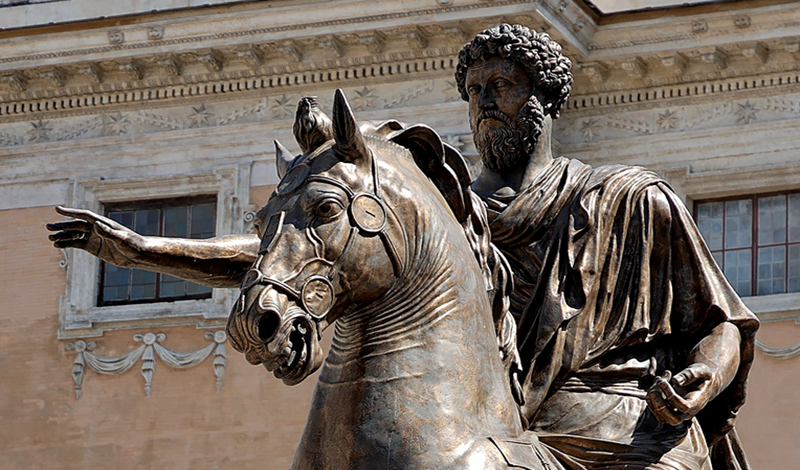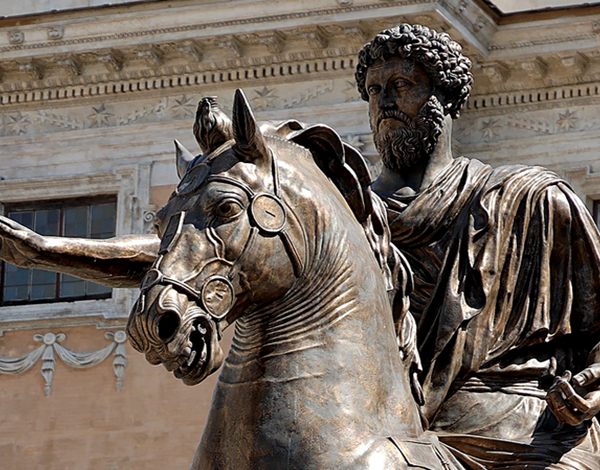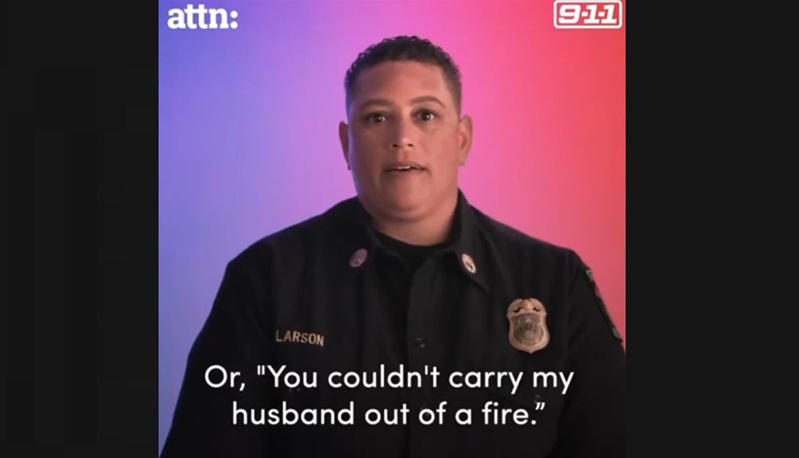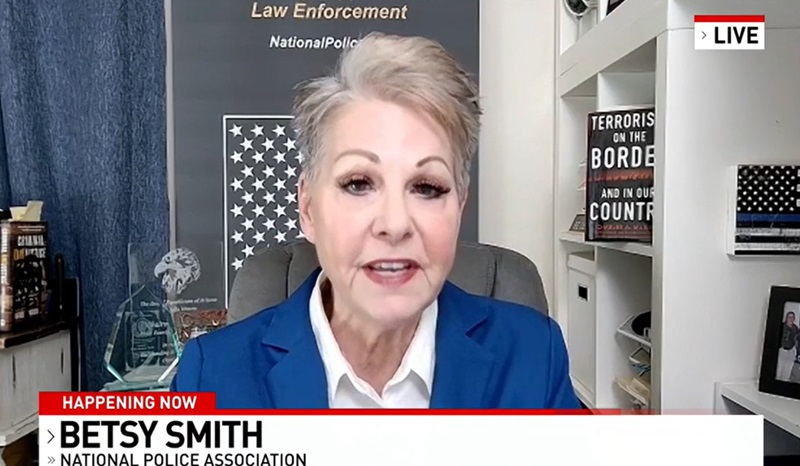
By Steve Pomper

Marcus Aurelius (121-180), Roman Emperor, Stoic Philosopher (Photo: Jastrow, Public Domain)
When I was first hired as a cop, our police chief gave each recruit Dale Carnegie’s book How to Win Friends and Influence People. Before the academy he “encouraged” us to read it and he’d ask us about it after graduation. Not surprisingly, we read it. After we’d graduated, he didn’t want to hear about our police training as much as he wanted to know what we’d learned from the book.
The principal focus of Carnegie’s book is human interactions in business, especially salesmanship. Our chief said he viewed police officers as salespeople, talking folks into buying what cops were selling: compliance.
I saw the value but wondered if there were better or other books that teach more broadly how to deal with people and the stress of the job. Books help us acquire knowledge we can apply in the world. So, I wondered can books on philosophy specifically help to make better cops?
Then I found a book a cop wrote on how philosophy can make cops better, thus better cops (more on that in a moment). Policing calmly in chaos is every cop’s goal. And while some are naturally better at it than others, every cop can improve.
Whether it’s a violent gang member, a whiny complainant, a sympathetic victim, a micromanaging superior, or a politically poisoned city government, cops exist in undulating degrees of chaos. It’s a turbulence continually morphing from storm to calm to storm and so on. The officer’s job is to quell the mind-storm and act calmly amid the chaos.
This topic may sound esoteric because, well, it can be. But that doesn’t make it any less valid. I’ve always been interested in philosophy, though I’ve never really studied it formally. But whenever I’d come across the topic, I’d felt an affinity for it. I realized that, without intending to, I think I was naturally a bit of a stoic.
After I retired, I began to dig a little deeper into the preeminent ancient Greek and Roman Stoics. People from a lowly Greek slave to one of the greatest Roman Emperors. I considered how what they teach, naturally applies to police work, like the four virtues: Courage, Temperance, Justice, and Wisdom (a little on-the-nose for cops, but that’s cool, right?)
Stoicism includes the lower case stoic-handling hardship without complaint and the upper case Stoics-students of Greek Stoicism founded by Zeno, as described by Stoic scholar Donald Robertson author of Stoicism and the Art of Happiness).
As I began to read more philosophy, I realized I’d intuitively though intermittently applied Stoicism during my career—I now see where other officers I admire had, too. I rarely brought the stress of my job—as it related to law enforcement—home. I called it compartmentalizing, which I now realize wasn’t entirely accurate. I’m beginning to think handling job stress had more to do with aspects of Stoic philosophy.
Once an officer leaves a call, the call should leave the officer. Stoicism teaches that cops should not take things personally at incidents. If things had gone well, don’t dwell too long on the successes, and if things hadn’t gone well, don’t linger long on the flops either. But if something you did caused things not to go well, resolve to do better the next time—and let it go.
Adopting the attributes of Stoicism can improve an officer’s job performance by improving an officer’s perspective generally. Many officers may find they also have a natural affinity for this philosophy and can benefit from being able to name it and by more thoroughly implementing it. Other officers may find Stoicism new but to be of profound value. Still others may at least glean helpful tips that’ll assist them on the job.
While Winning Friends and Influencing People is an iconic and useful book, as mentioned above, another book I recently discovered, written by Arizona cop Bill Mauro, The Stoic Cop, seems a worthy alternative or companion. The Stoic Cop concentrates on police officers specifically, focusing on the importance of virtue, controlling perceived chaos, and putting reason above passion while performing their duties—and living their lives.
Officer Mauro relates the benefits of officers studying and applying Stoicism in police work. He doesn’t condescend in an I know, and you don’t, manner. Instead, as a peer, he relates his own missteps that he says Stoicism has helped him correct.
Probably trickiest for some (Many? Most?) cops is Stoicism’s focus on controlling ego. Being significantly type-A personalities whose job it is to “tell people what to do” and to “fix their problems,” managing one’s ego can be challenging. Knowing what is within your control and what is not means controlling the ego.
Mauro wrote about how the great Stoics like the Roman Emperor Marcus Aurelius (Meditations), former slave Epictetus (Discourses), and politician Seneca (Letters from a Stoic) learned and taught that the foundation of happiness (eudaimonia) is, first, to know what we control, what we don’t, and to proceed from there.
DailyStoic.com adds to the list of great people influenced by Stoic philosophy: “Frederick the Great, Montaigne, George Washington, Thomas Jefferson, Adam Smith, John Stuart Mill, [and] Theodore Roosevelt….” Incidentally, Teddy Roosevelt was NYPD’s first police commissioner.
Stoicism teaches that we can’t control everything that happens to us, but we can control how we react/respond to it. Also, the Stoics teach that acts of true strength matter but might not be what we think. In police work, that can be knowing when to verbally disengage with a suspect rather than to engage. Officer Mauro gives an example of suspects chipping at officers to prompt angry and inappropriate reactions, which can get officers disciplined, fired, or even prosecuted.
So, why does what some thug says trigger cops to such anger? Ego. Stoicism teaches that what someone else says matters only if we allow it to. Why do we care about the words of someone we’ve probably never seen before and will probably never see again? And even if we have seen them before and will see them again, so what? What they say still doesn’t have to matter to us. It’s our choice. So much stress and poor decision making can come from allowing verbal provocations to matter when they don’t.
Officer Mauro relates a story of a suspect who incessantly chipped at him from the backseat of his patrol car. This was after he’d begun studying Stoicism, so he didn’t give the suspect the reaction he’d wanted. He remained calm during the suspect’s storm. Eventually, instead of an invective-laced ping-ponging insult-fest, Mauro said the suspect quieted and eventually even apologized for his tirade.
This story rang true because I had a similar incident. I didn’t have Stoic philosophy in mind at the time, but I had also maintained my cool when I had a suspect in my patrol car’s backseat yelling at me, calling me all kinds of (well, you know what they say), who was begging for me to retaliate. The call had involved a crashed stolen car, fleeing felons, and some “do-gooder,” cop-hating social justice warriors who’d run to the crash scene to “help.”
Long-story-short, the haters fought the cops, and a melee ensued. Punches were thrown, kicks had flown, pepper was sprayed, and we ultimately arrested the bad guys.
My suspect was particularly vocal in his objection to being arrested for “only trying to help the crash victims.” But I remained calm while he raged. Then, during a lull, I explained to him that the car was stolen and that several suspects had bailed out after crashing into a concrete bulkhead. Now, he knew the cops’ perspective.
The young community organizer became quiet and grew thoughtful. A few moments later, still headed to the precinct, he asked me, “Was the car really stolen?”
I answered, as I’d like to think the great Roman Emperor Marcus Aurelius might have. “Yup.”
Then the suspect shocked me (not easy to do to a cop). He apologized for attempting to assault me and resisting arrest. For the rest of the trip he was the perfect prisoner. He also cooperated while I signed him into a precinct holding cell and then behaved himself during transport and booking into jail (later he and his comrades would sue the officers, but you get the point).
Like Officer Mauro, if I’d engaged the suspect like he wanted me to, I would have made my job harder and also more difficult for transport officers and jail staff who’d have to handle him after me.
By allowing reason to overcome passion, chaos turned to calm even if only from my perspective. I’m not saying this will always happen—it won’t. But even if only you remain calm while a suspect continues to rage, you’ve controlled what was in your control and what the suspect said didn’t matter.
Remember this from DailyStoic.com. The Stoic philosopher Epictetus observed, “What upsets people is not things themselves, but their judgments about these things.” If you judge things as not important, they won’t upset you.
Let’s end with the GoodReads.com description of Officer Mauro’s book, The Stoic Cop. “Learn to bridge the gap between police and citizen relationships, deal with difficult people, navigate department politics, and more. Learn to control your perceptions, opinions, and emotions and become a better, more virtuous police officer. Most importantly, control your perceived chaos.






